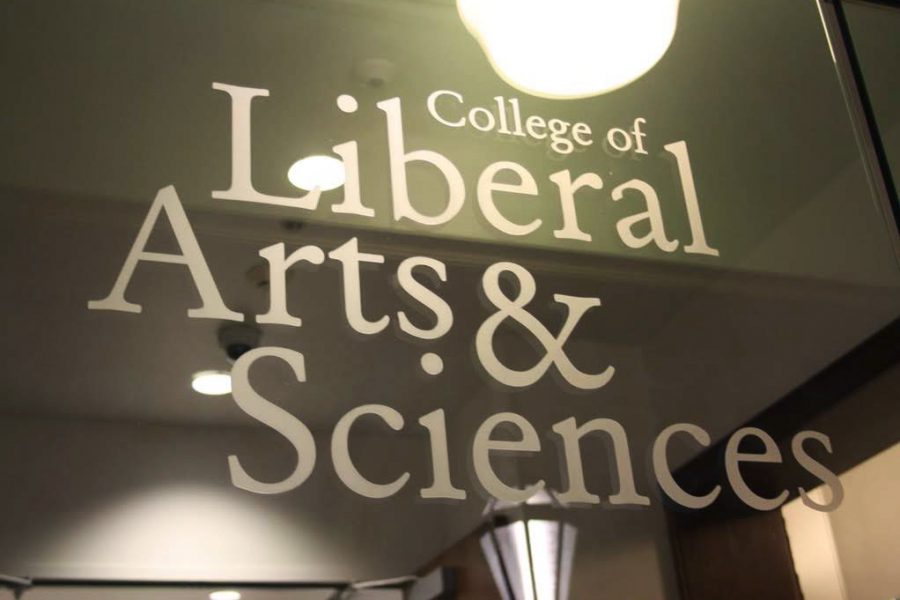Embrace a liberal arts mindset
A College of Liberal Arts & Sciences decal is pasted onto the door of their main office Nov. 14, 2018. University students shouldn’t rule out liberal arts if they are interested in pursuing it in the future.
July 15, 2021
Like many middling high school students hailing from the Chicago suburbs, the University of Illinois at Urbana-Champaign wasn’t so much a place you went as much of a place you ended up. That is, unless you were going for computer science or engineering. I, of course, was studying neither.
Luckily, all my presumptions about this university were proven wrong once I got down here and actually gave the place a shot. What I had perceived as a monolith of computer-engineering with a neglected humanities conglomerate was, in actuality, a world-class institution consisting of all disciplines ranging from STEM to the humanities and the arts that thrives at their respective intersections.
If this piece is supposed to offer you, a new student, some guidance, let it be this — embrace a liberal arts mindset, no matter your field of study. Take classes from a broad array of disciplines, even those without any concrete technical applications.
One of this university’s greatest strengths is the opportunity it gives for students to take classes across a large field of disciplines. Unlike many higher-ranking institutions, entry-level and upper-level classes are seldom restricted to majors-only, and can be taken by any student, regardless of major or class-status. (Disclaimer: this isn’t true for every class. However, I, a journalism student, could have taken MATH 227: Linear Algebra for Data Science, CS 125: Introduction to Computer Science and ENGL 451: The Twentieth-century American Novel my first semester of college. Point being, there are more classes open to you than you think.)
One of the most infuriating things to me is when someone (incorrectly) assumes that a liberal arts degree is worthless. Firstly, liberal arts students are extremely employable and exit college with a wide variety of easily transferable skills applicable to the job market. Secondly, and more importantly, there is more “worth” to a field of study than its monetary value.
Get The Daily Illini in your inbox!
Life is not a job training factory, and college shouldn’t be either. Yes, the main reason why most of us go to college is to obtain a degree to better one’s chances in their respective job markets — but that shouldn’t be the only reason. The skills you will attain by taking classes in a wide variety of subjects will not only make you a stronger candidate for any job but will make you a more well-rounded person as well.
I despise terminal occupational thinking. Not everything is oriented around the job market. I abhor the term “networking” — it implies that something as earnest and pure as connecting with someone else is transactional. Let college be full of experiences, both personal and academic, that will enrich you as a person without worrying whether or not it’ll impact your employability in the long run. Of course, this isn’t to encourage you to make bad decisions about your educational experience and future, instead, I urge you to pursue classes and literary achievements that will both lead to a prosperous career and leave you with a wide breadth of knowledge.
My freshman year, I took Journalism 452: Great Books of Journalism. It was a small class, maybe 14 or 15 students, each of them a journalism major or minor, except for one. One student, whose name I’ll both omit for privacy, and because I cannot clearly remember it, was an engineering major.
On the first day of class, the professor went around the room and asked each of us why we signed up for this class and what we hoped to get from it. The engineering student answered by saying he was simply interested in reading more nonfiction, and wanted to take more non-engineering classes before graduating. And as the class progressed, this student was perhaps the most valuable contribution to our class discussions, bringing a non-journalist’s perspective to pieces of literature analyzed to death from a journalistic perspective.
STEM majors, if there are any reading this, you should obviously focus on your course of study. But don’t only focus on your course of study. Take more classes outside your major than the required general education courses, schedule permitting of course. In the case your course load leaves you with little flexibility in terms of credit hours, make the most out of your gen-ed classes. I know the option of taking a blow-off class for a gen-ed is tempting — and I’ve certainly given into temptation before — but I urge you to expand your horizons and take an academically rigorous course outside your comfort zone.
Best case scenario, you evoke a newfound passion for a new field you previously wouldn’t have taken and change the course of your life. Worst case, you’re left with a new skill to add to your resume and a cool dinner party story, which is still pretty good if you ask me.







